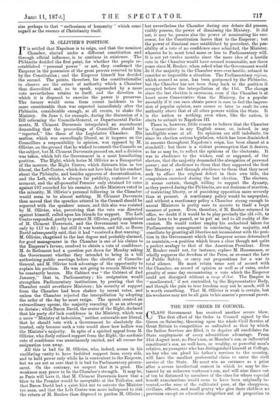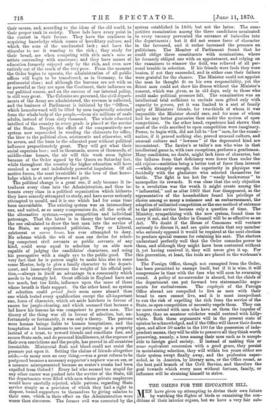THE NEW ORDER IN COUNCIL.
CLASS Government has received another severe blow. The first effect of the Order in Council signed by the Queen on Saturday, throwing open the whole Civil Service of Great Britain to competition as unlimited as that by which the Indian Services are filled, is to deprive all candidates for State employment of every adventitious advantage. From 31st August next, no Peer's son, or Member's son, or influential constituent's son, no well-born, or wealthy, or powerful man's relative, no youngster who has distinguished himself at College, no boy who can plead his father's services to the country, will have the smallest preferential claim to enter the civil service of the State. Ho must win an entrance as a prize after a severe intellectual contest in which he may be dis- tanced by an unknown workman's son, and will nine times out of ten be distanced by members of the class for whose especial benefit examinations would seem to have been originally in- vented,—the sons of the cultivated poor, of the clergymen, civilians, officers, and small gentry who give their children no provision except an education altogether out of proportion to their means, and, according to the ideas of the old world, to their proper rank in society. These lads have every point in the contest in their favour. They have the readiness in acquiring knowledge which comes of hereditary culture, and which the sons of the uneducated lack ; and have the stimulus to use it wanting to the rich ; they study for their bread, are when competing with rich men's sons as artists contending with amateurs ; and they have means of education formerly enjoyed only by the rich, and even now entirely out of the reach of the very poor. From the moment the Order begins to operate, the administration of all public offices will begin to be transferred, as in Germany, to the professorial class ; and although the bureaus are not with us as powerful as they are upon the Continent, their influence on our political course, and on the success of our internal policy, is still very great. The Colonies are governed, the civil depart- ments of the Army are administered, the revenue is collected, and the business of Parliament is initiated by the "Offices," which henceforward will be filled by men impartially selected from the whole body of the people,—from six millions of male adults, instead of from sixty thousand. The whole educated intellect of the country in every grade is placed at the service of the State. Despite the effect of the comparatively new system now superseded in weeding the claimants for office, the blow to the political class, aristocratic and otherwise, will be severe, and the boon to the educated poor without political influence proportionately great. They will get what their social superiors lose ; and in thousands, scores of thousands, of middle-class homes, the air will this week seem lighter because of the Order signed by the Queen on Saturday last, while throughout the country the higher education will have received a new and indefinitely powerful impulsion. Of all motive forces, the most irresistible is the love of that know- ledge which is at once pleasure and gain.
The political change is a great one, if only becausa it in- troduces every class into the Administration, and thus in- terests every class in a political organization which hitherto they have scarcely attempted to study, and have never seriously attempted to mould, and it is one which had for some time been unavoidable. The existing system was an intermediary one, and united, as so many compromises do, all the evils of the alternative systems,—open competition and individual patronage. That the latter is in theory the better system, the one calculated to draw the best men into the service of the State, no experienced politician, Tory or Liberal, aristocrat or novus honao, has ever attempted to deny. No scheme which the wit of man can devise for select- ing competent civil servants or public servants of any kind, could seem equal to selection by an able man capable of judging the candidates' characters, and using his prerogative with a single eye to the public good. The very fact that he is patron ought to make him also in some sense Mentor, help to give a family character to the depart- ment, and immensely increase the weight of his official posi- tion,—always in itself an advantage to a community which needs to be strongly led. Great officials in England have not too much, but too little, influence upon the mass of those whose breath is their support. On the other hand, no system of selection could prima facie seem more absurd than one which tested every qualification except the all-important one, force of character, which set aside hatchets in favour of razors for jangle-clearing, and which assumed that because a lad knew his lessons he was competent to govern men. The theory of the thing was all in favour of selection, but, un- fortunately or fortunately, it was only a theory. The patrons were human beings liable to human temptations, and the temptation of human patrons to use patronage as a property instead of a trust, to reward friends and conciliate foes, and secure State ends, and do personal kindlinesses, at the expense of their own convictions and the people, has proved in all countries irresistible. Ministerial flesh and blood could not resist the pressure put upon it. Setting the claims of friends altogether aside,—to many men an easy thing,—was a great reform to be postponed because a necessary supporter's nephew was an ass, or a measure misrepresented because an orator's cousin had been expelled from Oxford ? Every lad who seemed too stupid for any other career was pushed into the service of the State, till the departments were filled with men whom private employers would have carefully rejected, while patrons, regarding State service simply as a provision of which they had a right to dispose, bound supporters to themselves by giving salaries to their sons, which in their effect on the Administration were worse than sinecures. The former evil was corrected by the system established in 1860, but not the latter. The com- petitive examination among the three candidates nominated to every vacancy prevented the entrance of imbeciles into the departments ; but it did not secure force of character in the favoured, and it rather increased the pressure on politicians. The Member of Parliament found that he could oblige three constituents with nominations, where he formerly obliged one with an appointment, and relying on the examiners to winnow the field, was relieved of all per- sonal trouble in selection. If his friends were fools they were- beaten, if not they succeeded, and in either case their fathers were grateful for the chance. The Minister could not appoint the man he thought fit on his own responsibility, yet the fittest man could not show his fitness without the Minister's consent, which was given, as in old days, only to those who- could make political pressure felt. The examination was an intellectual trial sufficient to exclude men gifted only with capacity to govern, yet it was limited to a sort of family party of Ministers' friends, for two-thirds of whom it was impossible the Minister should care, and for none of whom had he any better guarantee than under the system of open competition. On the other hand, experience had shown that most of the evils ascribed to open competition were imaginary. Power, to begin with, did not fall to "low " men, for the exami- nation, if it proved nothing else, proved unusual culture, and unusual culture and " lowness " of the deprecated kind are inconsistent. The farrier's or tailor's son who wins in that intellectual game is, with rare exceptions, perforce a gentleman. Many candidates, no doubt, might lack force of character, but the failures from that deficiency were fewer than under the- old regime—ambition being a better test of force than interest —while, strangely enough, the superiority in physique was decidedly with the gladiators who selected themselves for battle. The fight is too hot for "weedy bookworms " to- monopolize its rewards. It was clear that the only objection to a revolution was the wrath it might create among the- " influential," and as after 1869 that fear disappeared, as the representative of the householders found his privilege of choice among so many a nuisance and an embarrassment, the adoption of unlimited competition as the one method of entrance. to the public service became only a question of time. The- Ministry, sympathizing with the new system, found time to- carry it out, and the Order in Council will be as effective as an• Act. We doubt if the House of Commons will venture- seriously to discuss it, and are quite certain that any member who seriously opposed it would be required at the next election to produce special reasons for retaining his seat. The electors understand perfectly well that the Order concedes power to- them, and although they might have been contented without it, yet having received it, they will never give it up. For this generation, at least, the tools are placed in the workman's- hands.
The Foreign Office, though not exempted from the Order, has been permitted to exempt itself, but if it is wise, it will compromise in time with the foes who will soon be swarming- round. A policy of no-surrender is absurd, but the chiefs of- the department can put forward two statesmanlike argu- ments for exclusiveness. The employes of the Foreign Office abroad are compelled to live as men with their- bread to earn cannot live, and it is most inexpedient- to run the risk of expelling the rich from the service of the- State, as open competition of necessity expels them. They can no more contend with men who have on them the impulse or hunger, than an amateur cricketer would contend with Lilly- white. Both these arguments will in the present state of- opinion be acknowledged, and if the Office will throw their doors: open, and allow 50 marks in the 100 for the possession of inde- pendent means, they will be able to preserve all they think worth preserving, namely, a tone among their men such as is accept- able to foreign good society. If instead of making this or some equivalent concession with a good grace, they persist in maintaining selection, they will within ten years either see- their system swept finally away, and the profession super- seded, as in America, by literary men, or the Office recast, as- the best paid branch of the Civil Service, and therefore the goal towards which every man without fortune, family, or influence will be straining himself to strive.































 Previous page
Previous page